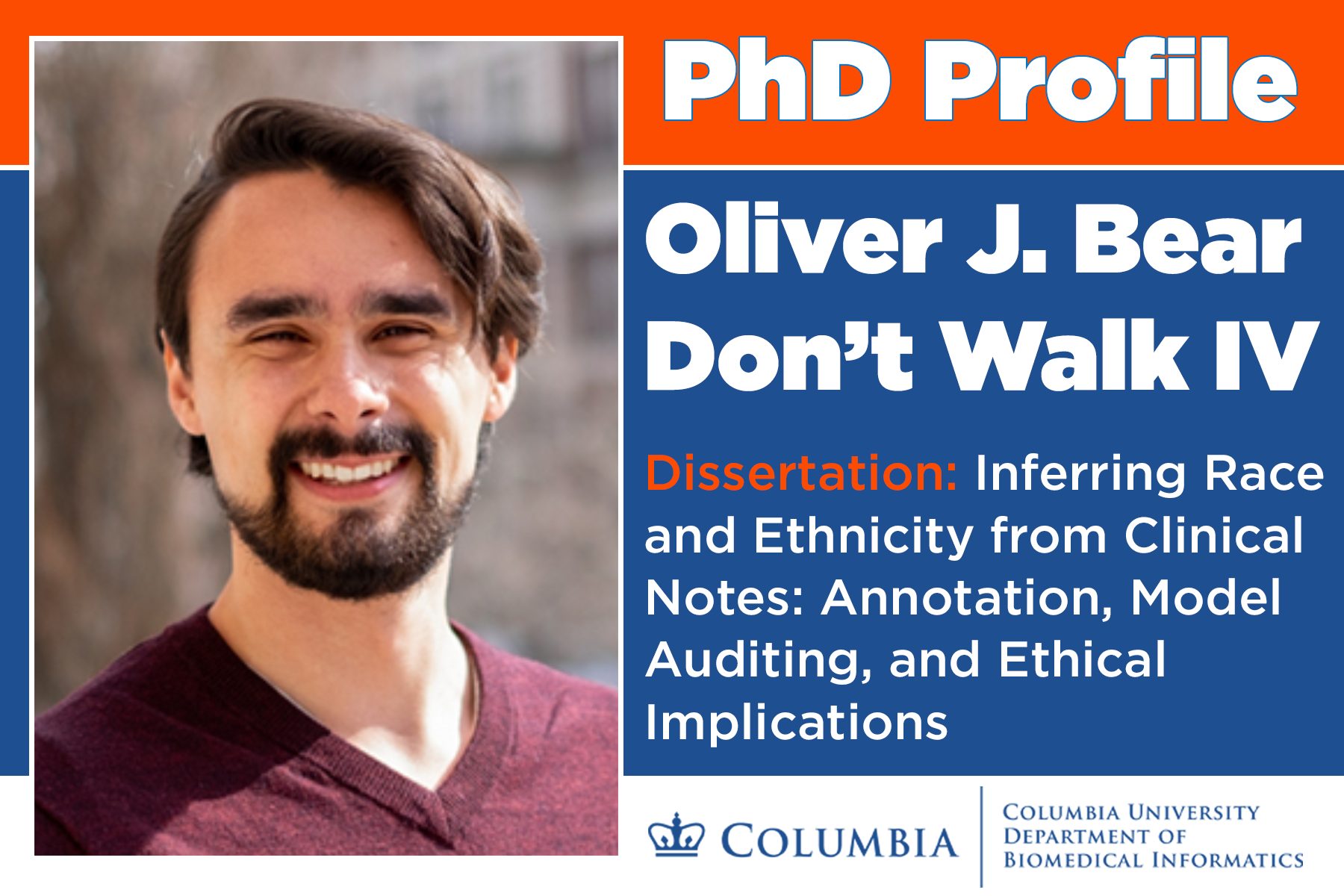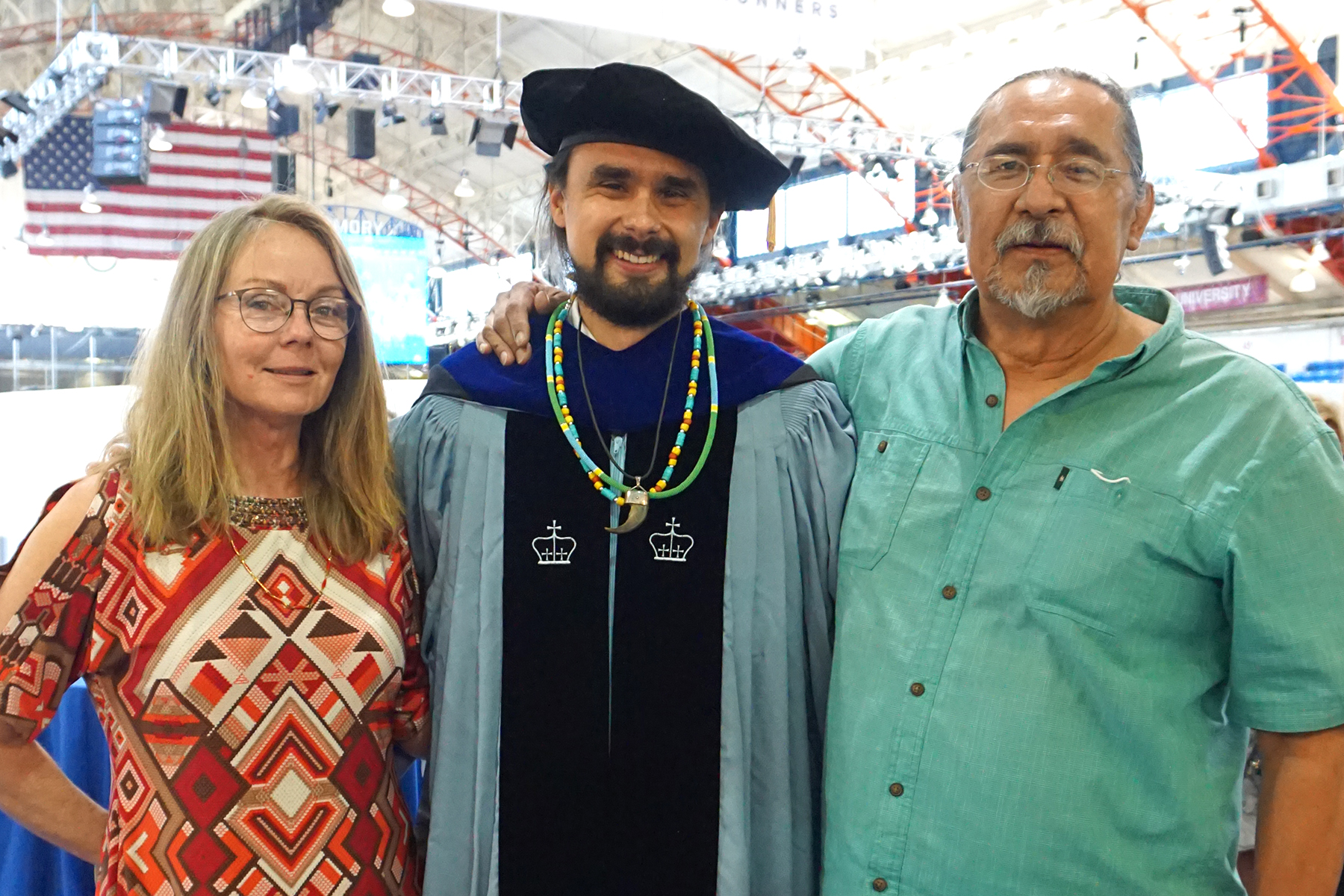PhD Profile: Oliver J. Bear Don't Walk IV
Improving equity in healthcare for marginalized communities was the primary focus for Dr. Oliver J. Bear Don’t Walk IV (he/they) during his PhD journey in biomedical informatics at Columbia University. His first two years set a research foundation and led to a JAMIA publication, but it started to stray from that original passion.
Then came the summer of 2020, when the killing of George Floyd sparked a national awakening for many people and drove Bear Don’t Walk to re-evaluate their work.

“These issues weren’t new to me,” said Bear Don’t Walk, a member of the Apsáalooke Nation. “They go way back for both African American and Native American people, but I had been really scared to rock the boat for a long time. If I’m not doing something to address inequality and injustice within communities here, then who will?”
That decision was both difficult and brave, as it forced him to reconsider the path he had navigated for 2+ years. He sought a direction that more aligned with his passion and values. It required great support from both his mentor, Noémie Elhadad, and peers, but it also provided the foundation of his doctoral dissertation (Inferring Race and Ethnicity from Clinical Notes: Annotation, Model Auditing, and Ethical Implications), which he successful defended earlier this year, and will be at the core of his upcoming postdoctoral work at the University of Washington.
Bear Don’t Walk’s research focused on exploring the relationships between direct and indirect explicit mentions of race and ethnicity (RE) and RE inferences in clinical text annotated by humans and introduces an approach to audit deep natural language processing (NLP) models for their learned associations.
“There are interpersonal biases, and then there are more systemic biases,” he added. “Those can enter at any level of clinical care into the electronic health record, but it’s particularly difficult within clinical notes because of their subjective nature.”

Oliver Bear Don’t Walk IV stands with his parents at graduation.
Bear Don’t Walk led a detailed review of ongoing ethics considerations within this area, which led to a JAMIA Open publication this past July (A scoping review of ethics considerations in clinical natural language processing). They then focused on both training a model to label sentences with RE information, as well as auditing the model to examine the alignment between salient features and RE indicators. There were learned associations that could be classified as benign mistakes, but others that were harmful and required future work to address them.
That future work is what they hope to focus on during their postdoc with Dr. Peter Tarczy-Hornoch at the University of Washington, a campus near to thriving Indigenous communities and only hours away from their hometown of Everson, Washington. They will also work with Dr. Trevor Cohen and Dr. Meliha Yetişgen to further investigate how to improve fairness for marginalized groups, especially within the Native American community.
“Oliver put his research towards informatics topics he was passionate about (specifically, clinical natural language processing and machine learning) and exploring them in the context of ethics and justice,” said Elhadad. “Research contributions at the intersections of fields are difficult: he had to broaden his scope of study, take a step back on his research questions, and learn to interact closely with ideas and people beyond his original domain of expertise. Oliver took the assignment to heart, and in fact extended this commitment in his service activities: he co-founded the Justice Informatics Group at Columbia DBMI and became a contributing member of the AMIA DEI Committee. I am excited to see his work continue to grow during his postdoc and the next stages of his career.”
 Community has always been important for Bear Don’t Walk, who felt like he needed to broaden his own when he chose to travel across the country for his PhD journey. He felt an immediate connection to the DBMI students while interviewing for PhD schools; he later helped build that same bond for others as a student representative within DBMI.
Community has always been important for Bear Don’t Walk, who felt like he needed to broaden his own when he chose to travel across the country for his PhD journey. He felt an immediate connection to the DBMI students while interviewing for PhD schools; he later helped build that same bond for others as a student representative within DBMI.
A connection with two students in particular were crucial for Bear Don’t Walk during his final couple of years in the program.
“Adrienne [Pichon] and Harry [Reyes Nieva], both in my lab, were hugely helpful in getting me to the finish line for my dissertation,” they said. “I broadened my understanding of my work from those discussions, and I appreciated being able to lean on them.”
He had strong connections with DBMI faculty as well, and he credits both Adler Perotte and Suzanne Bakken for helping him find the right path for his work. The connection with Elhadad was critical, and not just for her expertise in machine learning and NLP.
“She gave me a push to be more confident in myself,” said Bear Don’t Walk. “I felt imposter syndrome at times. She told me ‘You’re capable of this, I’m going to show you, and then you’re going to do it.’ “
While imposter syndrome is a common obstacle for PhD students, his challenge may have been exacerbated from a lack of faculty who shared his background.
“Going through the academic system and seeing very few Native Americans in STEM leadership roles made me realize that if I had seen more people like that, it would have been easier to connect and make me feel like I belong here,” said Bear Don’t Walk, who took a leadership role in the DBMI Summer Fellowship Program, where they mentored high school students and undergraduates from diverse backgrounds. “I realized that I’m here now, so now is the time to start being that person and letting people from marginalized communities know that they can do this. We’ll make this a good place to do the work you want to do.”


